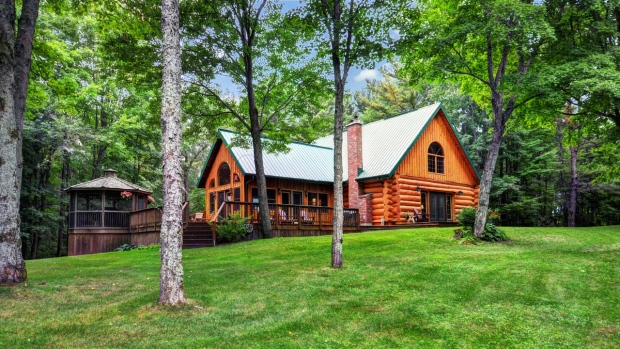Cottages are the new ownership dream for young people
Forget buying a house in Toronto: Cottages are the new ownership dream for young people, says report
Two-thirds of Canadian millennials would consider buying a recreational property like a cottage or cabin
By Alexandra Sienkiewicz, CBC News Posted: Jul 01, 2017 6:00 AM ET
With the high cost of real estate in Toronto pricing many first-time homebuyers out of the market, millennials are starting to look outside the city — way outside.
They’re not looking with the intention of buying a home, but rather buying a recreational property like a cottage, cabin or ski chalet.
A report released this week by RE/MAX and Leger said almost two-thirds of Canadian millennials would consider buying a recreational property in the next 10 years.
Adrienne Atkins, 29, falls into this group, having just recently bought a property in Grand Bend.
“It’s really unaffordable in the city, I wanted a bit more bang for my buck,” Atkins said. The Yonge and Eglinton resident doesn’t yet know if she’ll make Grand Bend her forever home, but said she would consider moving if she could find flexible work.
Residential sales ‘unprecedented’
Suzanne Martineau has also seen an increase in millennial interest in the Muskoka region, where she leads a team of agents with RE/MAX Hallmark Realty. She describes the growth in residential sales as unprecedented, and said it’s “definitely being driven by the city.”
“I hear often, the city is too congested, it’s getting too busy, it’s unaffordable, it’s not an enjoyable lifestyle.”– Suzanne Martineau, RE/MAX Hallmark Realty
“I hear often, the city is too congested, it’s getting too busy, it’s unaffordable, it’s not an enjoyable lifestyle… so [people] are rethinking their choices in life,” she said. “With technology, I think it’s allowing people to be employed further from core centres in this country.”
Martineau added that millennials she’s met who have moved to the Muskoka region “know what they want” and that they’re making “very active choices to be in a more natural environment.”
“Some of them raise chickens, some of them live on three or four acres … some of them want to be off-grid,” she explained.
Off-grid trend is growing
The off-grid trend is one Martineau said has grown in the last year, noting that in the past off-grid properties were difficult to sell — whereas now they’re purposely being sought out.
Laurie McVey, 29, is a Toronto office manager and executive assistant who started her search for a recreational property in the spring.
Despite making “fairly good money,” the reality of buying a home in Toronto “will just never happen,” she said.
“Even if I can get a home in Toronto, it’s only going to be a shoebox, and I don’t want a shoebox,” she said, adding that she has two dogs and that condo life is not conducive to pets.
After years of frustration seeing real estate prices rise at rates that didn’t match the increase in her salary, she contacted a real estate agent in Muskoka. Unlike her friends, who she said have moved out of the city to own a property, she plans to buy a recreational property, which she could potentially rent out when she’s not using it.
Listings in cottage country down
The increasing popularity of recreational properties is well-reflected in real estate listings and prices. In Muskoka, the number of listings is down 41 per cent since 2016, with sales up 21 per cent in the first quarter. Martineau speculates that residential sales will be even “more extreme” for the second quarter — which tends to be the region’s busy season.
Prices have also jumped, with many properties being sold at asking or above, and bidding wars becoming more common, which Martineau called “very unusual.”
She credits some of that to city buyers.
“They’re coming from a very aggressive environment and bringing those behaviours with them … which isn’t always necessary up here,” she said. “It’s been interesting to watch how buyers are coming up from the city and placing offers on properties — they’re coming in strong, hard and firm, even without competitive bids.”
This behaviour is also reflected in other popular cottage-country areas, to the east of Muskoka.
Take for example the region of Haliburton, which has seen a 42 per cent increase in year-over-year prices for non-waterfront properties. That being said, even with the price hike, the average price of a property in Haliburton is $66,038 according to RE/MAX — a steal for anyone used to Toronto prices.
Waterfront properties have also seen a jump, with prices in regions like Prince Edward County, Wasaga Beach and the Bruce Peninsula seeing growth of up to 38 per cent.
Get a local real estate agent
Martineau does have one piece of advice for people from the city looking for recreational properties: get a local agent. The regions are so wide and have certain quirks, so agents who do most of their business in the city may not be aware of certain specifics — which could mean a buyer pays more than the property is worth.
There are some things Atkins said she would miss about the city, including the conveniences and having everything within a five-minute walk. But, she said: “I’ve lived here my whole life so I’m good to move somewhere quieter.”
McVey echoed Atkins’s feelings, saying: “Getting away into a small town is a huge relief from being in the city,” adding that she won’t miss much about Toronto.


